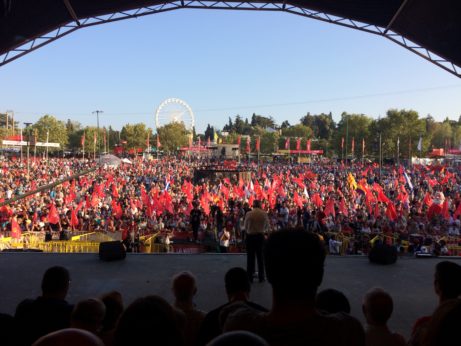
AMORA, Portugal—Anyone who says socialism and love of country don’t mix better take a look at Portugal’s Communist Party and think again. If there is any group here that can claim a history of fighting for the best interests of the whole nation while also being true to the global struggle for change, it’s the Portuguese Communists. This is the party, after all, that kept the flame of democracy burning even during a half-century of fascist dictatorship and secret police terror.
This weekend in the Lisbon suburb of Amora, the party took its message to hundreds of thousands of people from across Portugal and around the world at the annual Avante! Festival (Festa do Avante!). Named after the party’s newspaper, Avante!, or Forward!, the event, now in its 42nd year, is a three-day jamboree of music, dance, sport, theater, debate, and more—all peppered with just the right dose of progressive politics. This was no dull conference with too many long speeches, but rather a celebration of life and a peek into a future of solidarity that might exist just beyond capitalism.
Headlined by big name Portuguese bands like Xutos and Pontapés as well as international acts, such as Palestine’s 47Soul and rock-gospel-blues singer Sharrie Williams from the U.S., the festival offers something for every musical taste. There was even a concert honoring the 200th birthday of Karl Marx by the Sinfonietta de Lisboa, featuring Aaron Copland’s “Fanfare for the Common Man,” Leonard Bernstein’s West Side Story, along with Tchaikovsky, Beethoven, and others.

In opening the festival, Portuguese Communist Party leader Jerónimo de Sousa characterized it as “the high point” of the party’s year. The festival, he said, gives party members and their allies “the strength and confidence to continue fighting…for workers and the people.”
The massacre of Portugal
And it’s just what this country needs. In the words of Jorge Cadima, a representative of the party’s International Department who spoke with People’s World on the sidelines of the festival, “Portugal was massacred”—first by the economic crisis that gripped the world starting in 2007 and then by the European Union’s forced austerity measures in response to it. Over the last several years, he says, more people in his country seem to be realizing that “capitalism has reached a point where it is unable to get out of its problems.”
Cadima highlighted the shrinking ability of the economic system to engage in socially useful, productive activity. Instead, it jumps from bubble to bubble, looking for the next temporary investment outlet. Along the way, more and more private debt—the costs of either failed investments, or more likely, successful predatory stripping of companies’ resources—“gets dumped into public hands.”

Trumpism and the increasing influence of the far-right is a symptom of this continued long-term crisis in the U.S., according to Cadima. The same thing is happening in many countries across Europe, Latin America, and Asia. And in places where the right gains power, they are preparing for an even darker future. “There is a growing consolidation of the mechanisms of authoritarianism and repression to use if and when they are needed.”
While Portugal has not, so far, seen an extreme nationalist and reactionary movement arise—the memories of the dictatorship of Antonio Salazar are probably still too fresh for that—it has been on the receiving end of harsh austerity measures and crushing economic diktats from the EU.
Here, the ongoing economic crisis has had what Cadima calls a “two-fold character”: class and national.
First, there was the capitalist class offensive against social welfare. The big European banks and the so-called troika of the European Commission, the European Central Bank, and the International Monetary Fund, took advantage of the crisis and forced crushing debt repayment measures on Portugal (as well as Greece, Italy, and Spain). The result was an accelerating downward spiral. As a condition of the 78 billion euro ($92 billion) bailout, wages were cut, pensions trimmed, health and education systems gutted.
The result? Unemployment doubled. From 2007 to 2016, over a million Portuguese citizens left the country in search of work—nearly 10 percent of the population. That exodus is still visible in the streets of Almada, a town just across the river from the capital. Block after block of apartments, but very few people in the streets, even during what should be a busy time of day.
The second aspect of how the economic collapse played out is the national one. The EU’s biggest economy, Germany, has exploited the situation of poorer countries to increase its own dominance over the continent’s economy. Even though most austerity orders came via the EU, it was always clear that Berlin called the shots on what countries trapped in debt would have to do in order to get help. Relief was held hostage, and the ransoms were high.
Ditching austerity
By 2015, the Portuguese people had enough. Parliamentary elections that year gave the combined left (Socialist Party, Left Bloc, Communists, and Greens) the biggest share of seats. But the conservative (and ironically named) Social Democratic Party was the single largest vote-getter, so it got first shot at forming a government.
To block them, the Communist Party went to the Socialists and offered to support them forming a government, but only on condition that it start reversing the worst of the measures implemented by the previous government, starting first of all with rolling back wage cuts, guaranteeing the 35-hour workweek, and increasing pensions. It wasn’t a coalition, but a deal was made. On the Communists’ initiative, Portugal ditched austerity.
After two-and-a-half years of re-investment in the public sector and a halt to most major cuts, the turnaround has been dramatic. Wages are up, unemployment is down, and the debt is shrinking. Among the Portuguese people, there is a new confidence—the sense that life can get better. Cadima says that “for the first time, people see something besides defeat is possible.” Even the mainstream establishment press is admitting that Portugal has shown there’s another way.
He cautions, however, that everything achieved so far was won only because Socialist Prime Minister António Costa was under pressure from the Communists and others on his left flank: “What the Socialist Party has done is not enough. If there was a different balance of forces in parliament, they would go back to their right-wing policies of the past.” They already have in some cases, keeping troika-imposed labor legislation, blocking industry-level collective bargaining, and increasing collaboration with NATO and the U.S.
With elections due by next fall, the Socialists are trying to leverage the popularity of the anti-austerity agenda to increase their support among voters, hoping to grow their own seat-count and not have to rely on the Communists to stay in office.
It’s a danger that PCP is well aware of. “The Socialists try to take credit for all the positive things achieved, but we tell the people that whatever you got out of them is only because of the strength of the Communists.”
Avante, camarade!

The Portuguese national spirit has been revived as a result of forcefully rejecting the agenda of Europe’s big capitalist powers; it represents the PCP’s approach of a “patriotic politics of the left” in practice. It’s a combination of the class struggle and the fight for national sovereignty.
Keeping it going though, is going to require a lot of work. “Real progress,” Cadima says, “is all going to come down to mass struggle.”
Back at the festival, that new sense of possibility is on full display at the closing rally, where hundreds of thousands gather to hear from the party general secretary on the struggles still to come.
Attendees embrace and the crowd moves in unison as their voices join to sing the party hymn, “Avante, camarade!”, followed by “The Internationale,” and the national anthem. Socialism, international solidarity, and love of country and people all combine.
The Avante! Festival organizes people to fight for the better world of the future while nourishing their souls to survive in the current one. It’s popular front politics at its best and embodies the spirit of hope that has returned to the Portuguese people after they stood up to austerity—and won.












Comments